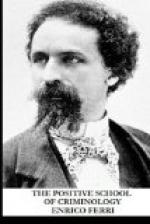This misunderstanding was explained at the congress of Geneva by the statement that the interaction of the social and telluric environment is required also in the case of the born criminal. And now we may take it for granted that my classification of five types is everywhere accepted. These are the following: The born criminal who has a congenital predisposition for crime; the insane criminal suffering from some clinical form of mental alienation, and whom even our existing penal code had to recognize; the habitual criminal, that is to say one who has acquired the habit of crime mainly through the ineffective measures employed by society for the prevention and repression of crime. A common figure in our large industrial centers is that of the abandoned child which has to go begging from its earliest youth in order to collect an income for the enterprising boss or for its poor family, without an opportunity to educate its moral sense in the filth of the streets. It is punished for the first time by the law and sent to prison or to a reformatory, where it is inevitably corrupted. Then, when such an individual comes out of prison, he is stigmatized as a thief or forger, watched by the police, and if he secures work in some shop, the owner is indirectly induced to discharge him, so that he must inevitably fall back upon crime.
Thus one acquires crime as a habit, a product of social rottenness, due to the ineffective measures for the prevention and repression of crime. There is furthermore the occasional criminal, who commits very insignificant criminal acts, more because he is led astray by his conditions of life than because the aggressive energy of a degenerate personality impels him. If he is not made worse by a prison life, he may find an opportunity to return to a normal life in society. Finally there is the passionate criminal, who, like the insane criminal, has received attention from the positive school of criminology; which, however, did not come to any definite conclusions regarding him, such as may be gathered by means of the experimental method through study in prisons, insane asylums, or in freedom. The relations between passion and crime have so far been studied on a field in which no solution was possible. For the classic school considers such a crime according to the greater or smaller intensity and violence of passion and comes to the conclusion that the degree of responsibility decreases to the extent that the intensity of a passion increases, and vice versa. The problem cannot be solved in this way. There are passions which may rise to the highest degree of intensity without reducing the responsibility. For instance, is one who murders from motives of revenge a passionate criminal who must be excused?




